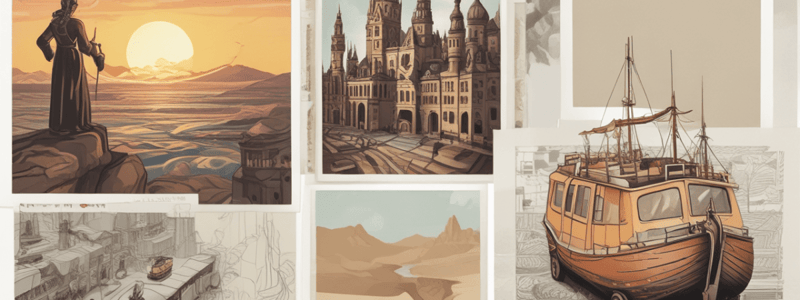Podcast
Questions and Answers
What is a mood board primarily used for?
What is a mood board primarily used for?
- To generate financial reports
- To create written documents
- To inspire creative design ideas (correct)
- To record scientific experiments
Which components can be included in a mood board?
Which components can be included in a mood board?
- Only color swatches
- Only text
- Images, text, and samples of objects (correct)
- Statistical data and graphs
What is the primary purpose of CAD in design projects?
What is the primary purpose of CAD in design projects?
- To assist in the creation of technical drawings and models (correct)
- To produce one-off prototypes
- To facilitate the buying process for clients
- To evaluate the strengths of a design
How does a prototype function within the design process?
How does a prototype function within the design process?
What defines the target user in a design project?
What defines the target user in a design project?
What is the difference between CAD and CAM in the context of design and manufacturing?
What is the difference between CAD and CAM in the context of design and manufacturing?
What aspect of design does evaluation primarily target?
What aspect of design does evaluation primarily target?
What role does color play in product design related to cultural perceptions?
What role does color play in product design related to cultural perceptions?
Which of the following colors is commonly associated with danger in product design?
Which of the following colors is commonly associated with danger in product design?
Which emotion can the color blue evoke in product design?
Which emotion can the color blue evoke in product design?
How can the use of color in product design influence customer behavior?
How can the use of color in product design influence customer behavior?
What is a characteristic of thermosetting plastics?
What is a characteristic of thermosetting plastics?
Which type of plastic is primarily used for application requiring high-temperature resistance?
Which type of plastic is primarily used for application requiring high-temperature resistance?
Which of the following applications would most likely use thermoplastics?
Which of the following applications would most likely use thermoplastics?
Which property best describes thermosetting plastics?
Which property best describes thermosetting plastics?
Which of the following is NOT a typical application of thermoplastics?
Which of the following is NOT a typical application of thermoplastics?
What distinguishes thermoplastics from thermosetting plastics?
What distinguishes thermoplastics from thermosetting plastics?
Which of the following is a type of thermosetting plastic?
Which of the following is a type of thermosetting plastic?
Which of the following statements about Urea Formaldehyde is accurate?
Which of the following statements about Urea Formaldehyde is accurate?
What is one significant environmental impact of plastic disposal?
What is one significant environmental impact of plastic disposal?
Which of the following statements is true regarding the manufacturing of plastics?
Which of the following statements is true regarding the manufacturing of plastics?
Which type of pollution is commonly associated with the disposal of plastics?
Which type of pollution is commonly associated with the disposal of plastics?
How does plastic manufacturing primarily affect air quality?
How does plastic manufacturing primarily affect air quality?
What environmental concern arises from improperly disposing of plastics?
What environmental concern arises from improperly disposing of plastics?
What is the primary function of a laser cutter?
What is the primary function of a laser cutter?
Which of the following materials can be processed by a laser cutter?
Which of the following materials can be processed by a laser cutter?
What characteristic defines the workings of a laser cutter?
What characteristic defines the workings of a laser cutter?
What is an advantage of using a laser cutter over traditional cutting methods?
What is an advantage of using a laser cutter over traditional cutting methods?
Flashcards are hidden until you start studying
Study Notes
Mood Board Overview
- A mood board is a visual presentation tool that combines various elements such as images, text, and material samples.
- Designed to convey a specific theme or concept visually, often used in creative fields like design or fashion.
Purpose and Function
- Serves as a source of inspiration, helping to organize and communicate ideas during the creative process.
- Can be based on a singular topic to focus ideas and direction for projects, ensuring coherence in design.
Composition Elements
- Typically includes a diverse mix of colors, textures, and typography to evoke certain emotions or aesthetics.
- May contain photographs, sketches, fabric swatches, color palettes, and relevant text that relates to the theme.
Usage in Creative Design
- Mood boards assist designers in exploring concepts and setting a visual tone for their projects before execution.
- Can be useful for presentations, enabling teams to align on vision and strategy through visual references.
Design Project Participants
- Client: The individual or organization purchasing the design project, usually seeking specific outcomes and functionalities from the design.
Market Considerations
- Target User: A specific segment of consumers characterized by shared needs, preferences, or demographics, crucial for tailoring design solutions effectively.
Design and Manufacturing Concepts
- CAD (Computer Aided Design): Utilizes software to create precise drawings and technical illustrations for design projects, enhancing accuracy and efficiency in the design process.
- CAM (Computer Aided Manufacturing): Integrates computer software for manufacturing processes, automating production tasks to ensure consistency and precision in creating products.
Prototyping and Evaluation
- Prototype: A unique, functional model created to test and assess the viability of design concepts before mass production, allowing for practical feedback.
- Evaluation: The systematic assessment of a design's strengths and areas for improvement, facilitating iterative development in both new and existing designs to meet user needs effectively.
Mood Board
- Definition: A visual presentation or collage comprised of images, text, and material samples.
- Purpose: To inspire creative design ideas based on a specific theme or topic.
Key Terms
- Client: Individual or entity purchasing a design project.
- Target User: Specific group of consumers with shared needs or characteristics.
- CAD: Abbreviation for Computer Aided Design, software used for creating precision drawings and technical illustrations.
- CAM: Abbreviation for Computer Aided Manufacturing, technology that uses software to control machinery and processes in manufacturing.
- Prototype: A one-off product created to test and evaluate a design concept.
- Evaluation: The process of identifying strengths and areas for improvement in an existing or new design.
Psychology of Colour
- Importance: Colour in product design can communicate messages and set moods.
- Cultural Considerations: The interpretation of colours can vary across different cultures, influencing design effectiveness.
- Examples of Colour Associations:
- Red: Often signifies danger or warning.
- Yellow: Can evoke feelings of joy and excitement.
- Blue: Typically associated with calmness and serenity.
Properties of Plastics
- Thermosetting Plastics: Retain shape once set; cannot be reshaped or recycled by reheating.
- Thermoplastics: Can be reshaped and reformed by reheating; recyclable.
Applications
- Thermosetting Plastics: Ideal for items needing to withstand moderate heat. Common uses include:
- Lamps
- Light switches
- Picnic plates
- Kitchen worktops
- Furniture
- Thermoplastics: Suitable for non-high temperature applications. Common uses include:
- Cold drink bottles
- Certain plastic furniture
- Wrapping films
- 3D printing
Types of Plastics
- Thermosetting Plastics:
- Melamine
- Urea Formaldehyde
- Thermoplastics:
- Polythene
- Acrylic
- Polystyrene
Properties of Plastics
- Thermosetting Plastics: Retain shape once set; cannot be reshaped or recycled by reheating.
- Thermoplastics: Can be reshaped and reformed by reheating; recyclable.
Applications
- Thermosetting Plastics: Ideal for items needing to withstand moderate heat. Common uses include:
- Lamps
- Light switches
- Picnic plates
- Kitchen worktops
- Furniture
- Thermoplastics: Suitable for non-high temperature applications. Common uses include:
- Cold drink bottles
- Certain plastic furniture
- Wrapping films
- 3D printing
Types of Plastics
- Thermosetting Plastics:
- Melamine
- Urea Formaldehyde
- Thermoplastics:
- Polythene
- Acrylic
- Polystyrene
Mood Board
- A visual presentation or collage combining images, text, and objects.
- Serves as inspiration for creative design projects.
- Can focus on specific themes and topics.
Key Terminology
- Client: The individual purchasing the design project.
- Target User: A selected consumer group sharing common needs or traits.
- CAD: Computer-Aided Design, used for precision in design projects.
- CAM: Computer-Aided Manufacturing, streamlining production processes.
- Prototype: A single product created to assess and evaluate design ideas.
- Evaluation: The process of identifying strengths and areas for improvement in designs.
Psychology of Colour
- Colors in product design can convey specific messages or moods.
- Cultural considerations are important when using color to evoke emotions, e.g., red may signify "danger" while blue may represent calmness.
Materials: Plastics
-
Thermosetting Plastics:
- Can be molded once but cannot be reshaped by reheating.
- Not recyclable after setting.
- Commonly used in items requiring moderate heat resistance (e.g., lamps, kitchen worktops).
-
Thermoplastics:
- Malleable when heated and can be reformed multiple times.
- Used for lower temperature applications (e.g., drink bottles, plastic furniture).
-
Types of Plastics:
- Thermosetting: Melamine, Urea Formaldehyde.
- Thermoplastics: Polythene, Acrylic, Polystyrene.
Environmental Impact of Plastics
- Disposal of plastics contributes to pollution in land, air, and oceans.
- The manufacturing process of plastics generates air pollution.
Mood Board
- A visual presentation featuring images, text, and material samples to inspire design ideas.
- Useful in conveying concepts and themes for clients and projects.
Client and Target User
- Client: Individual or entity purchasing a design project.
- Target User: Specific group sharing common needs and characteristics.
Design Technology
- CAD (Computer-Aided Design): Software for creating precision drawings and technical illustrations.
- CAM (Computer-Aided Manufacturing): Technology that uses software and computer-controlled machinery to automate manufacturing processes.
Prototyping
- Prototype: A single product created to assess design concepts and functionality.
- Evaluation: Process to identify strengths and areas for improvement in a design.
Psychology of Colour
- Color impacts product design, influencing mood and perception; examples include "danger" associated with red and "calm" linked to blue.
- Cultural contexts can alter the interpretation of colors in design.
Materials: Plastics
-
Thermosetting Plastics:
- Harden permanently after shaping and cannot be re-formed or recycled.
- Commonly used in applications requiring resistance to moderate heat, such as lamp bases and kitchen worktops.
-
Thermoplastics:
- Can be reshaped and recycled by reheating.
- Ideal for products that don't require high-temperature resistance, including drink bottles and wrapping films.
-
Types of Plastics:
- Thermosetting Examples: Melamine, Urea Formaldehyde.
- Thermoplastic Examples: Polythene, Acrylic, Polystyrene.
Environmental Impact of Plastics
- Disposal of plastics results in pollution in land, air, and oceans.
- Manufacturing processes contribute to air pollution, raising environmental concerns.
Laser Cutter
- A machine that utilizes lasers for cutting and engraving various sheet materials, including acrylic and plywood.
Studying That Suits You
Use AI to generate personalized quizzes and flashcards to suit your learning preferences.




